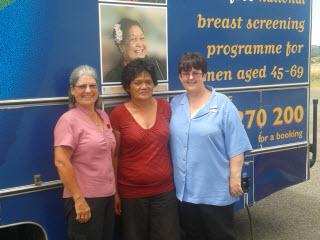- Home
- News
- Screening Matters, Issue 39, April 2013
- Community relationships key to high Māori breast screening participation rate
News
- Screening Matters Newsletter
- April 2019
- April 2018
- December 2017
- August 2017
- April 2017
- December 2016
- October 2016
- March 2016
- November 2015
- August 2015
- June 2015
- April 2015
- February 2015
- December 2014
- October 2014
- August 2014
- June 2014
- April 2014
- February 2014
- December 2013
- October 2013
- August 2013
- June 2013
- April 2013
- February 2013
Screening Matters
The National Screening Unit newsletter
In this issue:
- Creative approach working for breast screening in the Far North
- Significant impact from HPV immunisation, suggests study
- Newborn Metabolic Screening Programme Monitoring Update
- Community relationships key to high Māori breast screening participation rate
- New Programme Manager for NCSP
- Newborn Hearing Screening Conference
- Upgrade of colposcopy software on track
- Permanent appointment for Marli Gregory
Community relationships key to high Māori breast screening participation rate

Whakatane kaimahi, breast and cervical screening services co-ordinator Sonia Stewart, who works with Te Puna Ora o Mataatua Charitable Trust, says recent visits by the mobile screening van to Waihou Bay and Te Kaha were again successful. Te Puna Ora o Mataatua Charitable Trust provides a number of health services including support to services for breast screening and cervical screening.
“These were regular, scheduled visits by the breast screening team and we managed to have 90 to 95 percent of eligible women screened while the van was there,” she says.
“These are very proactive communities which know the value of breast screening.”
The mobile van spent four days in Waihau Bay during January and screened 67 women. In Te Kaha, 126 women were screened over a two-week period – 101 of these were Māori. This number was more than the previous year.
“It’s a great result,” says Sonia Stewart.
She attributes the success to the small community and the local rural GP practice, Te Whanau a Apanui Community Health Clinic, which over time has formed good relationships with key stakeholders, including the mobile van screeners. She says being from the area helps her to spread the word about the mobile van’s visit and to support both the local community and the visiting breast screening team.
“There are key messages put in the local rural GP practice panui/newsletter Horirerire, signs and posters put up at the kohanga reo, kura/schools, marae and shops,” she says. “The GP practice rings around eligible women to inform and encourage them to be screened and Te Runanga o Te Whanau a Apanui helps with transporting ladies who live 30 or 40 minutes away.” Sonia also helps with transport if required.
“It’s all about having good relationships, trust, being informed and a collaborative, cohesive approach,” she says. Women are getting to know the mammographers and they value a warm, friendly welcome when they step into the van. It’s making a real difference to our breast screening rates.”
To receive the Screening Matters newsletter by email, fill out our sign-up form.

